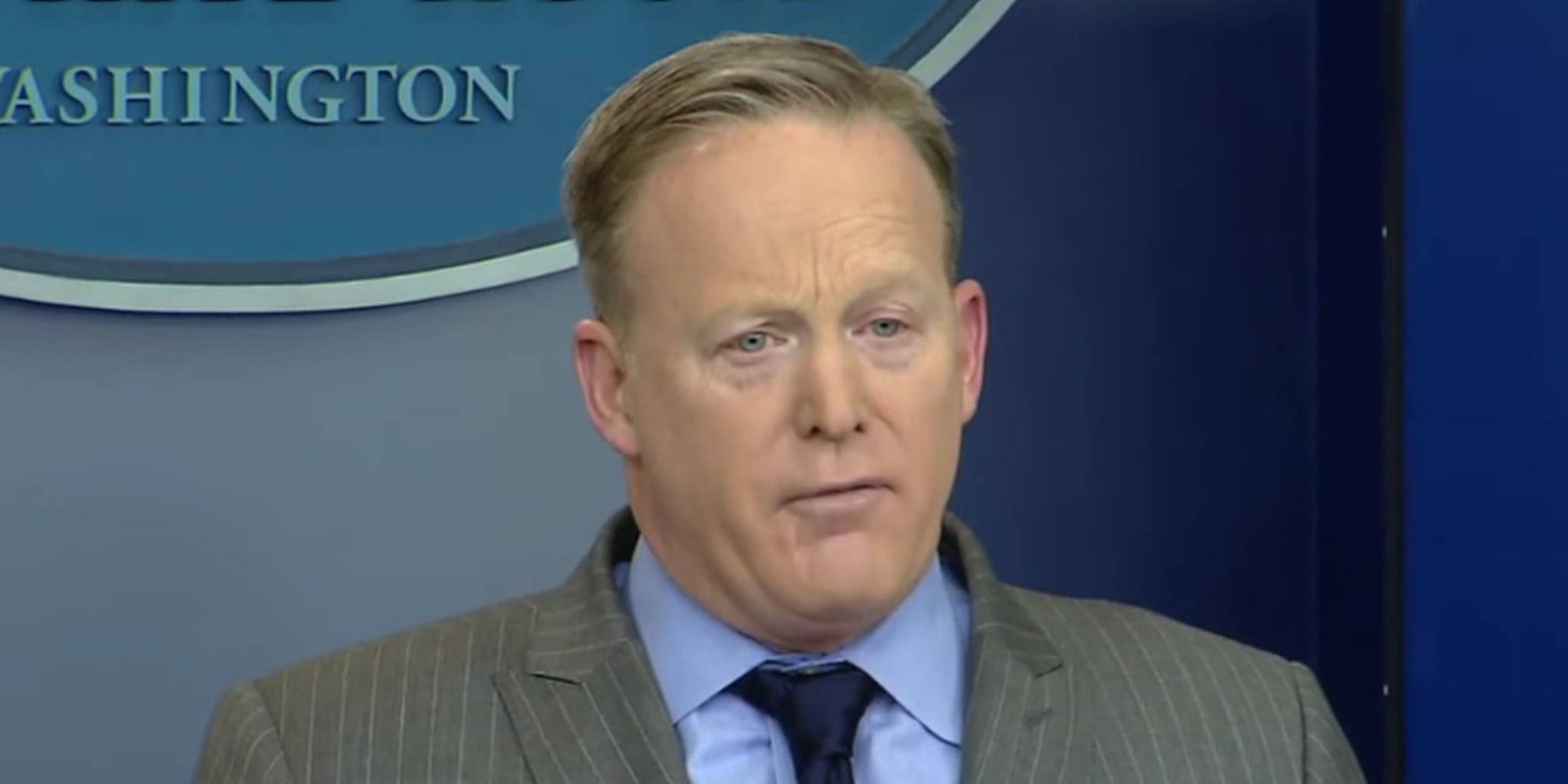In a breach of protocol, the White House on Friday reportedly blocked a select group of news organizations from attending a press briefing.
According to Politico, which was among the press outlets restricted from the meeting, White House Press Secretary Sean Spicer was scheduled to hold an on-camera press conference. Instead, Spicer banned certain journalists from prominent news outlets such as the CNN from attending the meeting.
The restricted briefing, Politico reports, including “a select group of journalists that include many conservative outlets,” raising concerns that the White House is attempting to curtail the number of critical reports related to a number of ongoing controversial activities.
It may also be the case that Spicer did not want to publicly field questions concerning the latest allegations of Russian ties to the Trump campaign, which surfaced Thursday night.
The New York Times, BBC, CNN, Los Angeles Times, BuzzFeed News, and Politico are among the outlets banned from the White House press briefing on Friday, while the attendance of CBS, NBC, Fox, ABC, One America News Network, the Wall Street Journal, McClatchy, Breitbart, and Washington Times was permitted.
“Free media access to a transparent government is obviously of crucial national interest.”
Jeff Mason, president of the White House Correspondents Association, condemned the actions of the White House in a statement.
“The WHCA board is protesting strongly against how today’s gaggle is being handled by the White House,” Mason said. “We encourage the organizations that were allowed in to share the material with others in the press corps who were not. The board will be discussing this further with White House staff.”
In an unprecedented fashion, President Donald Trump and his surrogates—Spicer included—have taken an adversarial stance toward the press, often deriding news stories unfavorable to the president as “fake news,” even if the reports contain factual information and sources from within the executive branch itself.
Speaking before the Conservative Political Action Conference (CPAC) on Friday, Trump repeated his claim that “fake news”—which by the president’s definition includes many mainstream media outlets—are the “enemy of the American people.”
“A few days ago I called the fake news the enemy of the people,” Trump said. “And they are. They are the enemy of the people.”
On Jan. 21, while addressing a crowd at the headquarters of the Central Intelligence Agency (CIA), Trump said: “As you know, I have a running war with the media. They are among the most dishonest human beings on Earth.” While not the first time Trump has expressed contempt for the press, his remarks at CIA appear aimed to convince members of the intelligence community that the news media is the enemy.
Less than a week later, White House chief strategist Steve Bannon, now a member of the National Security Council, repeatedly referred to the news media as “the opposition party” during a New York Times interview. “I want you to quote this,” Bannon said. “The media here is the opposition party.” The remarks appear to indicate that the White House desires it to be widely known that the White House perceives the press as the enemy.
According to Politico, the Associated Press and Time voluntarily chose not to attend the unusual White House briefing out of “solidarity” with their colleagues who were excluded, a move that garnered praise online and among other White House correspondents.
The Wall Street Journal, which did attend the closed briefing, said it would boycott future meetings that restricted the access of credentialed reporters.
“The Wall Street Journal strongly objects to the White House’s decision to bar certain media outlets from today’s gaggle,” the paper said. “Had we known at the time, we would not have participated and we will not participate in such closed briefings in the future.”
Dan Baquet, executive editor of the New York Times, sharply criticized the administration’s actions. “Nothing like this has ever happened at the White House in our long history of covering multiple administrations of different parties,” said Baquet, adding: “Free media access to a transparent government is obviously of crucial national interest.”
Carrie Budoff Brown and John Harris, two Politico editors, released a memo to employees saying the excluded publications plan to “very vigorously assert and defend an independent media’s right to cover the institution of the presidency.”
“Selectively excluding news organizations from White House briefings is misguided and our expectation is that this action will not be repeated,” Brown and Harris said.
H/T Politico


